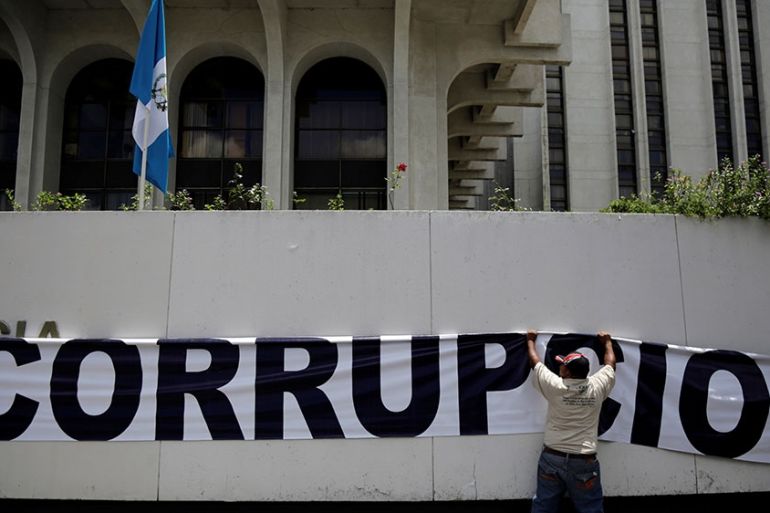Guatemalan officials arrested for corruption after leaving office
The officials, including an ex-congresswoman and ex-mayor, lost immunity after a new administration was sworn in.

Guatemala City – In an apparent effort to crack down on corruption, Guatemalan authorities have started to arrested officials who lost their immunity from prosecution this week when a new administration took office.
Police, armed with arrest warrants for eight high-level officials, executed 14 search warrants between Wednesday and Thursday. A former congresswoman and a former mayor were arrested. The other six were not located.
Keep reading
list of 3 itemsGuatemalan president takes office amid asylum deal controversy
Latin America in 2020: Stories to watch
“The work that the Special Anti-Impunity Prosecutor’s Bureau has been doing should be acknowledged,” Accion Ciudadana President Edie Cux, a lawyer and anti-corruption activist, told Al Jazeera.
President Alejandro Giammattei and legislators were sworn in Tuesday, and municipal councils took office Wednesday. Outgoing president Jimmy Morales regained immunity Tuesday night in another post, but other officials from his administration, plagued by allegations of corruption, lost their protection.
Former congresswoman Aracely Chavarria was arrested on Wednesday for influence peddling. She and three former congressmen who could not be located for arrest were allegedly part of a criminal structure engaged in fraudulent contracts and illegal commissions in the public health sector.
Two of the former legislators with pending arrest warrants belonged to FCN, Morales’ party, including its former presidential candidate Estuardo Galdamez. He was noticeably absent on Tuesday during the special transition session in Congress, during which he and others lost their immunity from prosecution.
Angel Ren, former mayor of the Chiche municipality 135km (84 miles) north of Guatemala City, was arrested on Thursday. He and another mayor from the Quiche department who was not located for arrest, both from the opposition UNE party, are accused of unregistered campaign financing.
Meanwhile, Acisclo Valladares, Morales’s former minister of the economy, presented himself to authorities on Wednesday for any open investigations. But police could not locate him on Thursday to execute an arrest warrant for alleged money laundering. Prosecutors have since requested Interpol issue a red alert.
A former Guatemalan member of Central American Parliament also now has an outstanding arrest warrants for fraud and money laundering. Former President Morales, under investigation for illicit campaign financing, was sworn into the regional cooperation body Tuesday night, regaining his immunity from prosecution just hours after he lost it. He has denied any wrongdoing.
The operations Wednesday and Thursday were coordinated by the Special Anti-Impunity Prosecutor’s Bureau, FECI. The Special Anti-Corruption Prosecutor’s Bureau and another unit focused on electoral crimes also have ongoing investigations that implicate recently departed government officials.
“Every prosecution unit undertakes the respective coordination with the [police], which is responsible for executing arrest warrants requested by prosecutors and authorised by judges,” Public Prosecutor’s Office spokeswoman Julia Barrera told Al Jazeera with regard to further operations to execute pending or new arrest warrants for former officials.
The United States has revoked visas for former government officials, the US embassy in Guatemala said in a statement Thursday without providing names. The embassy has revoked the visas of more than two dozen Guatemalan citizens this month and approximately 250 last year for a variety of reasons, including acts of corruption.
“Individuals affected by these revocations include former government officials and others,” according to the statement.
During his inaugural address on Tuesday, Giammattei repeatedly pledged to end corruption. As his first act of government, just hours later, he signed an inter-institutional anti-corruption agreement with the attorney general, comptroller general, superintendent of tax administration, and other officials.
Guatemalans wary
For now, many Guatemalans are wary of the promises. Morales also took office promising to combat corruption but then began to wage war on the body at the forefront of that fight after its investigations implicated Morales, his relatives, and his party.
For more than a decade, the UN-backed International Commission Against Impunity in Guatemala (CICIG) worked with Guatemalan prosecutors to investigate and take down criminal networks deeply entrenched in state institutions. Their work led to the resignation and arrest of President Otto Perez Molina in 2015.
Morales announced in 2018 he would not renew CICIG’s mandate and barred the head commissioner from Guatemala the following year, calling him a security threat. CICIG shut down last September.
“Many of the investigations playing out today go back years,” said Cux. “Many were investigations that developed when CICIG was still in the country.”